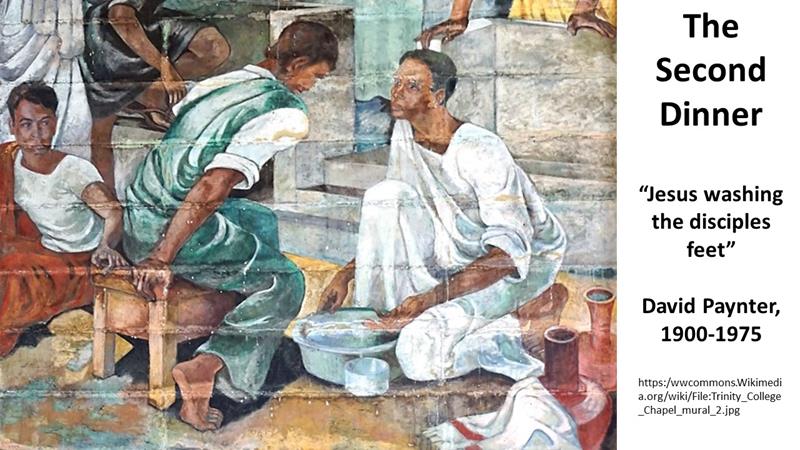 Jeff Garrison
Jeff Garrison
Skidaway Island Presbyterian Church
John 13:1-20
March 29, 2020
Before reading the scripture, I want us to take a look at our image for the day, which can help us get into the text. We’re looking at part of a mural by the late David Paynter titled, “Jesus washing the disciples’ feet.” The setting is along the Sri Lankan coastline. Zoom in on the guy on the left, a servant, who’s looking at what’s going on.[1] Let’s get into his head:
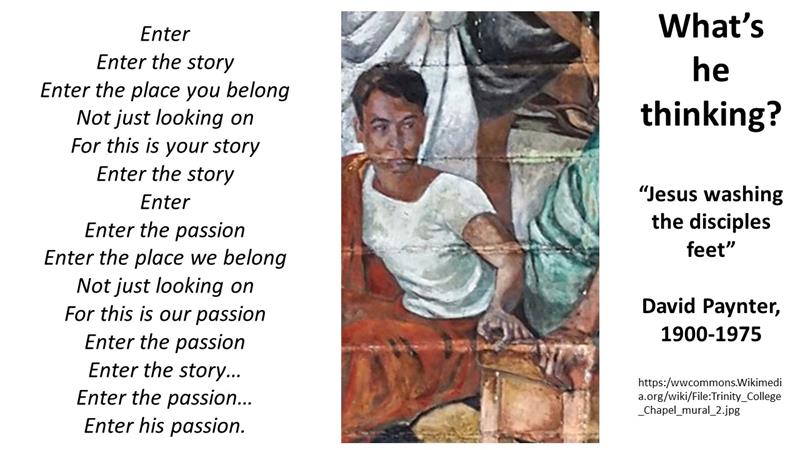 Jesus and the disciples have booked my master’s banquet hall. I have prepared everything according to their wishes and am ready with the water and basin as I always am. Years ago, my parents gave me to the owner as collateral for the debt they owed. But things did not go well for them, and the debt was never repaid. And so, I work to pay it off. Roman law says that someday I could be a freed person, but I will never again have the full rights in society. I’m marked as a slave for life. I keep my head down and do what the master asks because legally he has the right to punish me.
Jesus and the disciples have booked my master’s banquet hall. I have prepared everything according to their wishes and am ready with the water and basin as I always am. Years ago, my parents gave me to the owner as collateral for the debt they owed. But things did not go well for them, and the debt was never repaid. And so, I work to pay it off. Roman law says that someday I could be a freed person, but I will never again have the full rights in society. I’m marked as a slave for life. I keep my head down and do what the master asks because legally he has the right to punish me.
So, here I am with the bowl, just waiting for the go-ahead. The honored guest will be first, of course, and I know which one he is by where he’s seated. This is protocol, everyone has a place according to status. When he shows up, I recognize him and remember the stories I have heard about this teacher. He says things that upset those invested in this system of status… things like “the last shall be first.” I just can’t imagine a world like he describes.
And then he comes up to me. Smiling, he takes the basin of water from my hands. He takes my servant’s towel and wraps it around his own waist and kneels, inviting Peter to come sit. This is going to be no ordinary night. I realize my life, my view of myself and my station in life, is never going to be the same.
Sung:
Enter
Enter the story
Enter the place you belong
Not just looking on
For this is your story
Enter the story
Enter
Enter the passion
Enter the place we belong
Not just looking on
For this is our passion
Enter the passion
Enter the story…
Enter the passion…
Enter his passion.[2]
Our Scripture this morning comes from the 13th Chapter of John’s gospel. Read John 13:1-20.
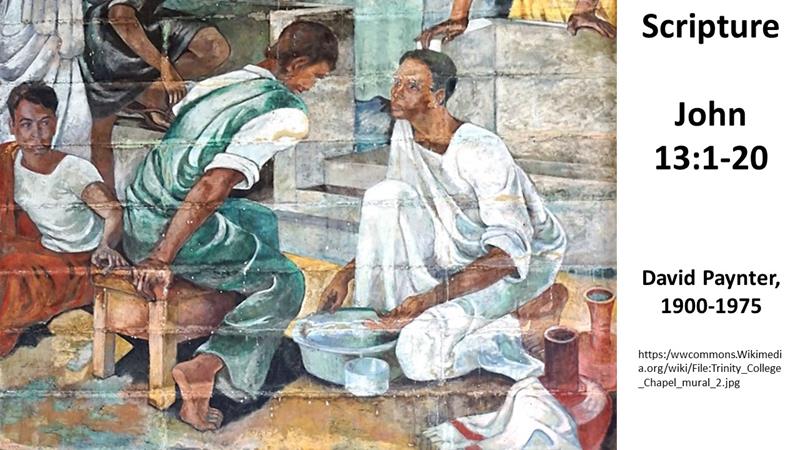
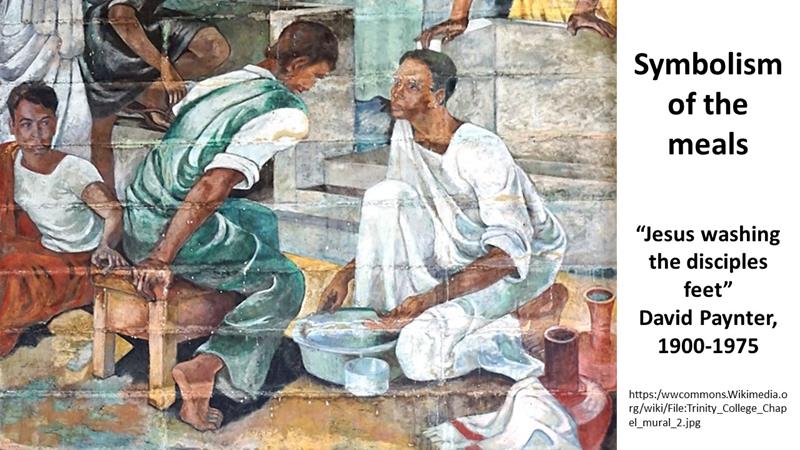 Last week we explored the first meal recorded during Jesus’ final week of earthly ministry. This is the dinner in Simon’s home interrupted by the woman with perfume anointing Jesus. Today, we’re looking at the second meal of this week. Of course, there weren’t just two meals eaten during these seven days. These are just the two recalled in the gospels. Both meals are rich with symbols. Last week, we could almost smell the expensive perfume being poured. This week, we have the bread and the wine, the foot washing, and the betrayal, all mixed in. We know this dinner as the “Last Supper” and there’s enough material here for two dozen sermons. I promise I won’t exhaust the passage.
Last week we explored the first meal recorded during Jesus’ final week of earthly ministry. This is the dinner in Simon’s home interrupted by the woman with perfume anointing Jesus. Today, we’re looking at the second meal of this week. Of course, there weren’t just two meals eaten during these seven days. These are just the two recalled in the gospels. Both meals are rich with symbols. Last week, we could almost smell the expensive perfume being poured. This week, we have the bread and the wine, the foot washing, and the betrayal, all mixed in. We know this dinner as the “Last Supper” and there’s enough material here for two dozen sermons. I promise I won’t exhaust the passage.
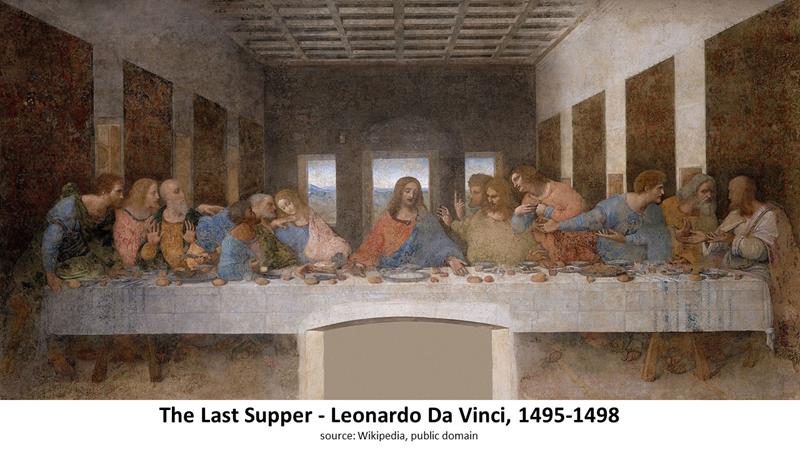
All four of the gospels have these stories about Jesus’ final meal with his disciples. John’s gospel, unlike Matthew, Mark and Luke, has a unique twist to it. Instead of it being the Passover, it’s the day before the Passover. You could say that in John’s gospel, they start partying early! Seriously, John wants us to think of Jesus as the Passover lamb, the one who was slain for our sins.[3] So the crucifixion occurs on Passover. The other thing John emphasizes is that there is evil lurking, but Jesus allows it to go on. It’s not like Jesus was dragged to the cross, as would have happened with most of those condemned to such a death, but that Jesus willingly gives up his life to fulfill a greater purpose. So, Jesus allows Judas to do his deed.
Interestingly, unlike the other gospels, John doesn’t recall Jesus reciting the words of the Lord’s Supper… There’s no, “This is my body broken for you…” or “This cup is the new covenant…” Instead, we’re told that as they enjoy the meal, Jesus does something strange. But before we get there, John tells us that Jesus loved the disciples to the end. Now, this can be taken that Jesus loved the disciples all along, up to this point, but there’s more here than that. It’s not merely a chronological statement, implying that up to this point in time Jesus has loved his disciples. Instead, it implies the fullness and completeness of his love. He will love them unto death, which will become clearer as the events of the night and next day unfolds.
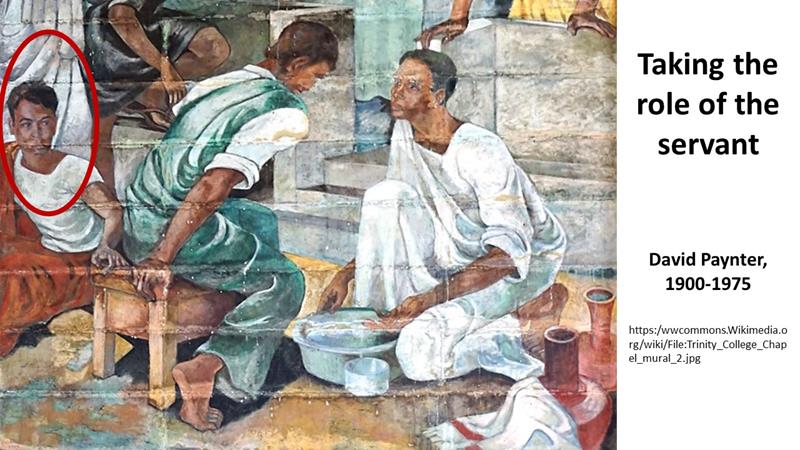
Jesus then assumes the role of the servant. For those of us living on this side of the resurrection, we immediately think of Paul’s “Christ Hymn” in Philippians, where we’re told that “Christ emptied himself, taking the form of a slave.”[4] Like a servant, like the dude in the picture whose job this should have been, Jesus goes around the table with a basin and washes the disciples’ feet. This is an example of extreme humility and sets up the rest of our reading. There are two implications of Jesus’ action. The first, which is covered in verses 6 to 11, is theological. This deals with our relationship to God. The second, covered in verses 12-20 is ethical. It focuses on how we relate to others.[5] Let’s look at each.
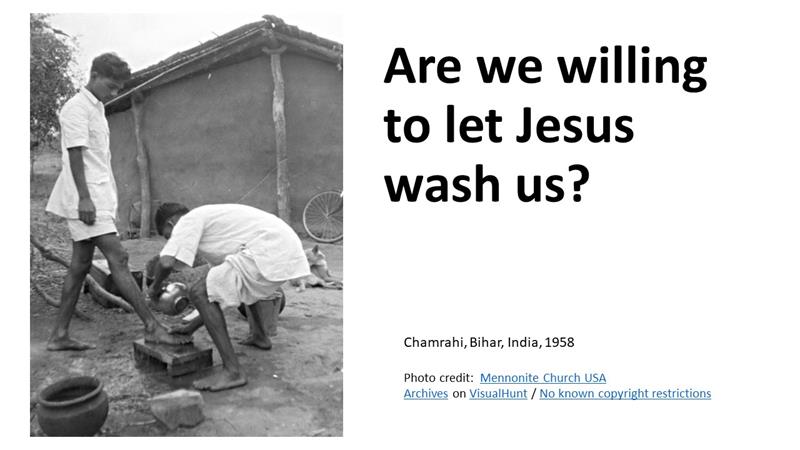
Peter has a problem with what Jesus is doing. In his book, this is just not right. The Master shouldn’t wash the dirty feet of the disciples. But Jesus not only offers to do this, he insists that he must. In verse 8, Jesus says that if he doesn’t wash Peter’s feet, he’ll have no share in him. The Gospel is summarized in this short sentence. We must be open to Jesus taking on our sins, washing them away, if we want to be in fellowship with him. This is the theological part of this passage. If we think we are too good or to dirty for Jesus to wash our feet, we won’t be able to share in his free grace.[6] Jesus freely takes up the towel and basin, just as he freely takes up the cross, and we have to accept him. Theologically, if we are not open to God doing for us what we can’t do for ourselves, we can’t experience grace.
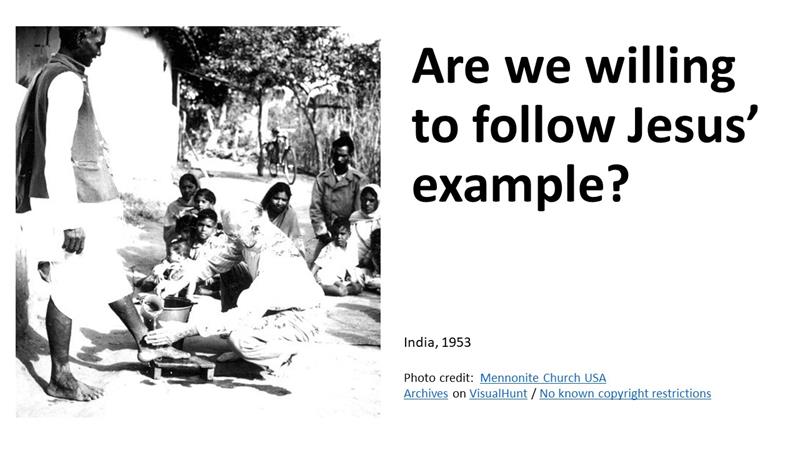 The second implication of the foot washing is ethical. “I’ve done this for you,” Jesus says, “so you need to do it to one another.” Jesus has shown us how to live our lives. We are called to live in mutual service, showing submission to one another, being willing to forgive when we are wronged, and having patience. All these traits, Jesus demonstrated. We too must learn from the Master. We must be willing to follow his example.
The second implication of the foot washing is ethical. “I’ve done this for you,” Jesus says, “so you need to do it to one another.” Jesus has shown us how to live our lives. We are called to live in mutual service, showing submission to one another, being willing to forgive when we are wronged, and having patience. All these traits, Jesus demonstrated. We too must learn from the Master. We must be willing to follow his example.
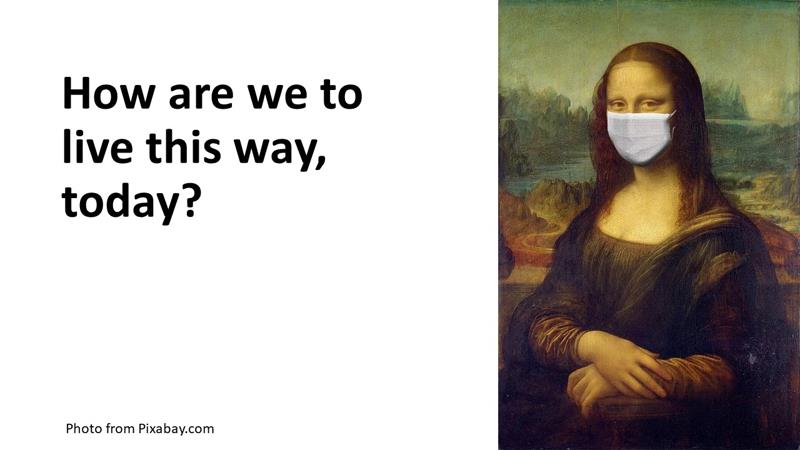
So how do we live this way at a time when we’re called to keep our social distance for the sake of society? Obviously, Jesus wasn’t worried about COVID-19 when he washed the feet of his disciples, and these days we’re told, again and again, to be sure to wash our own hands. We are living in a unique time. After all, we been called to sit on the couch and watch TV as if that’s a sacrifice. But we got to do more. We are still the church deployed in the world.
Who wasn’t moved by the story of the priest in Italy whose parishioners purchased him a respirator? But the priest insisted the respirator be used on a child who was ill.[7] He died. That’s showing the extreme side of what Jesus is talking about here.
But there are other things we all need to be doing. Staying away from others and isolating ourselves will help slow this disease. With the marvels of technology, we can still be connected through the phone and over the internet. And don’t forget the U. S. mail. The Session and Pastors of this church have made a commitment to call every member every week through this crisis. If you don’t get a call, let me know. We’ll see to it that you are included. And you can join us in calling and checking in on one another. After all, we do have new directories that are well suited for this. There are those who live by themselves and are lonely. Let’s do what we can to stay connected. We can also uphold one another in our prayers. We can write letters of encouragement. We can still be supportive of organizations that are making sure the most vulnerable in our communities are safe and cared for during this scary time. Did you know that this congregation collected 190 pairs of socks on the last day we were able to meet in worship? This Monday, those socks will be taken to Union Mission to be distributed.
Finally, we’re living in a time when we should be extremely grateful for others. Think of the sacrifices others are making, as they assume the role of the servant. Those work in the hospital, whether they are doctors and surgeons or the cleaning staff, they’re on the front line for us. And how about those who work in the club here at the Landings, working hard to get for food and groceries to us. Those who pick up our trash. And don’t forget the grocery workers, those in the shipping industry, those making masks and gowns for the medical profession. At a time like this, we need to remember all these people we depend on and be thankful and grateful.
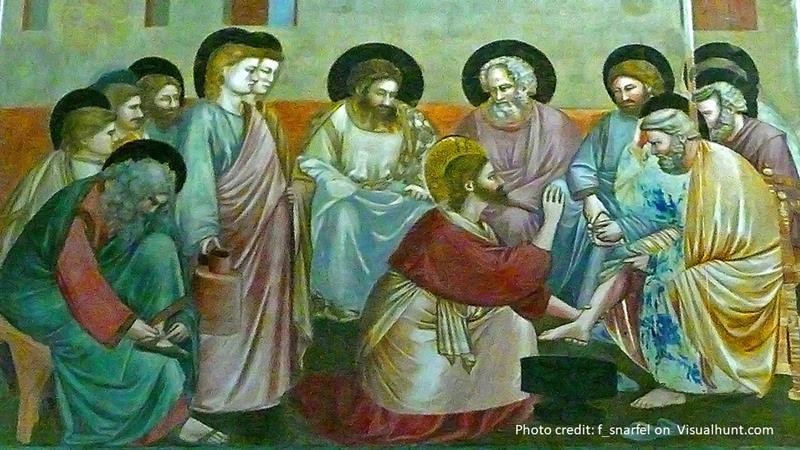 Jesus comes before us at the table, with a towel wrapped around his waist and a basin. He kneels. Do we let him wash our feet? And, if so, are we willing to humble ourselves and serve others in the manner that he has served us? These are questions we need to ask ourselves. Amen.
Jesus comes before us at the table, with a towel wrapped around his waist and a basin. He kneels. Do we let him wash our feet? And, if so, are we willing to humble ourselves and serve others in the manner that he has served us? These are questions we need to ask ourselves. Amen.
©2020
[1] A copy of this mural is in the “Art in the Christian Tradition” collection at Vanderbilt Divinity Library in Nashville, Tennessee. The original is in Trinity College.
[2] This edited monologue and song is from the Worship Design Series: “Entering the Passion of Jesus: Picturing Ourselves in the Story.” Subscription from www.worshipdesignstudio.com.
[3] This image of Jesus as the Passover lamb becomes clearer in John’s revelation. See Revelation 5:12 and 6:1.
[4] Philippians 2:7.
[5] Frederick Dale Bruner, The Gospel of John: A Commentary (Grand Rapids, MIhigan: Eerdmans,2012), 749.
[6] Bruner, 765.
[7] https://nypost.com/2020/03/24/italian-priest-dies-of-coronavirus-after-giving-respirator-to-younger-patient/

Those work in the hospital, whether they are doctors and surgeons or the cleaning staff…
Absolutely! The Environmental Services people at my hospital probably have the most dangerous of the service support jobs. Low pay but they have to enter a COVID room to clean and disinfect it for the next patient. We on the engineering staff enter those rooms as well, but not until they have been cleaned.
Top it all off I know Environmental Service people that have to work two jobs to make ends meet.
Sadly, often the most necessary are the least appreciated, except for in God’s kingdom where the last are the first.
We need to be very aware right now that we have leaders who are not of the washing-others’-feet variety. The greed and inefficiency of a profit-based healthcare system has incalculably amplified the human suffering and death in the United States since the outbreak of this virus, and that for the sake of maintaining immense profits for a tiny few. It is good to remind us that we should cherish one another. But churches have a duty, in the tradition of Christ, to be disruptive of immoral power structures. Most American churches are now in the position of defending ethically indefensible practices and people. What’s your take on the church’s role in advocating for better policy in the United States?
There is a lot broken in our country right now, and our health care system is near the top (perhaps only behind our political system). I don’t think it is the church’s role to defend the status quo, as our vision is of something that beyond what we can imagine. So no, I am not going to defend our current medical system, but at the same time I do not bring my own political positions on issues such as health care into the pulpit. The church’s challenge to the status quo is through believers who catch a vision that this world, while created good, fails to live up to the design God intended. We are called to something better. If only enough people would catch such a vision.
lovely verses….
Just my opinion, in the current condition, we need to take care each other…
Yes, and hopefully this pandemic will help us be more aware of the needs of others.
Always uplifting and comfortable to journey through your posts. Take care, and stay safe. We will get through all of this, stronger and much more compassionate I truly believe. At work our guests as we call Target shoppers are all so grateful for our being there, and they are thankful for the small things they once took for granted. My how our unexpected things have a way of opening our eyes and hearts.
I like the notion of referring to your shoppers as guests and not shoppers!
Such a pretty verses 🙂
Thank you!
Humility seems to be a common theme as I make my rounds in the blogosphere today.
The concept of “essential workers” has put a lot of professions in a new light, I think. We stand in awe of those who are out doing amazing work for the general good and rightly so. Those same professions might have been held in contempt not long ago.
The same happened during 9/11. The term “first responders” didn’t even exist in common parlance before then. But will this well-deserved respect survive in the long term?
Humility tends to be easily understood when we are challenged with something that we don’t understand and can’t control.